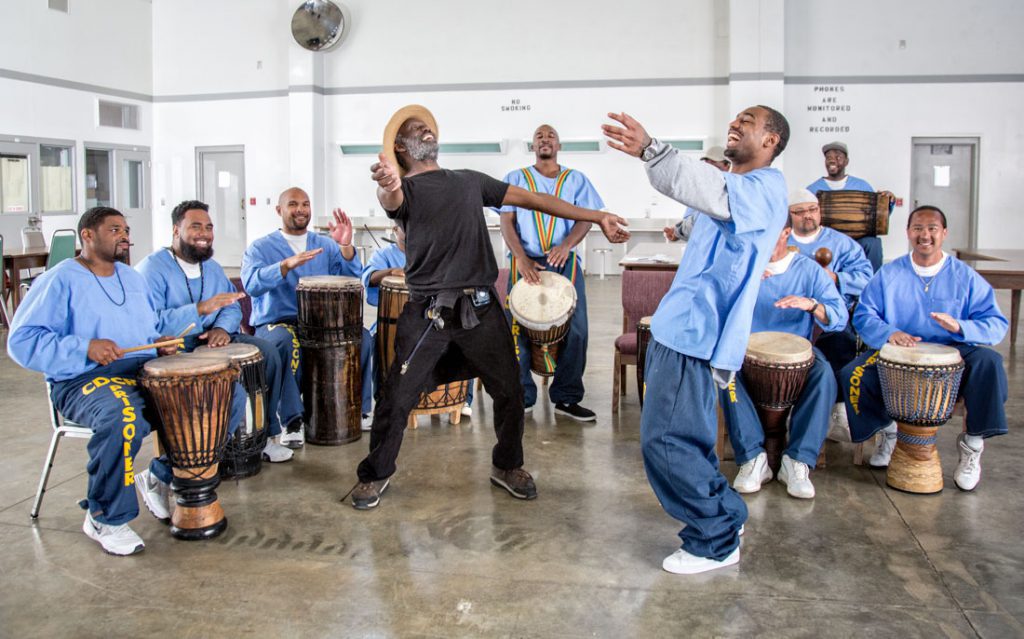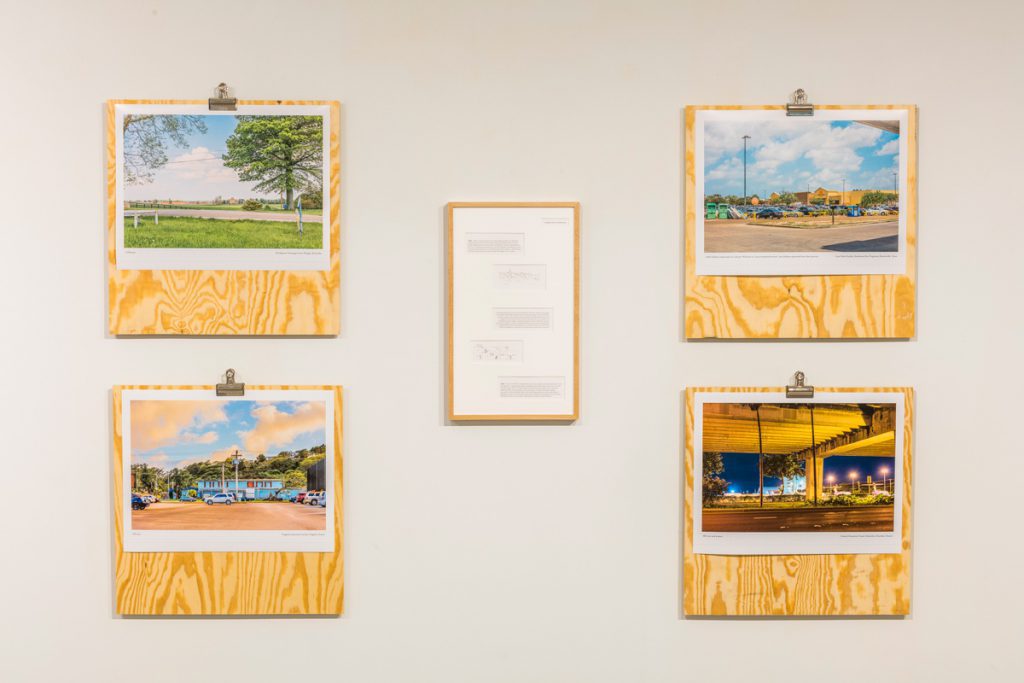Claremont, Calif. (August 28, 2019)—Pitzer College Art Galleries presents two complementary exhibitions that look critically at the social impacts of the American penal system, the aesthetics of mass incarceration, and art’s capacity to create change in the lives of individuals who are incarcerated.
 Peter Merts, Untitled (2015), Archival pigment print 16 x 20 in., (Instructor Wilfred Mark of Dance Kaiso, in black, during a drum and dance class at the Salinas Valley State Prison.) Courtesy of the artist.
Peter Merts, Untitled (2015), Archival pigment print 16 x 20 in., (Instructor Wilfred Mark of Dance Kaiso, in black, during a drum and dance class at the Salinas Valley State Prison.) Courtesy of the artist.Disruption! Art and the Prison Industrial Complex and Ashley Hunt:Degrees of Visibility run concurrently from September 14 through December 6, 2019, in the Nichols Gallery and the Lenzner Family Art Gallery, respectively, on the Pitzer College campus. An opening reception will be held September 14, from 2:00 to 4:00 p.m., with a performance in Nichols Gallery at 2:30 p.m. by artist Karla Diaz that features recipes created by people incarcerated in California using the limited food items found in the prison commissary.
Disruption! is a multimedia exhibit of the work of nine artists: four who are currently or formerly incarcerated and five who address the prison system in their work. Curated by Annie Buckley, the exhibit addresses issues of racial and economic injustice that continue to plague the American criminal justice system, impacting not only individuals, but community and family members as well.
 Ashley Hunt, Degrees of Visibility (installation view)
Ashley Hunt, Degrees of Visibility (installation view)Degrees of Visibility is a nine-year survey by Ashley Hunt of carceral spaces throughout the US. Each site is photographed from a publicly available point of view, yet represents a landscape wherein the prison may or may not be visible. Hunt’s photographs look at how prisons are presented and camouflaged without our everyday perception and how they contribute to an aesthetics of mass incarceration.
“These two exhibitions powerfully resonate with Pitzer College’s dedication to prison education and justice initiatives,” says Ciara Ennis, director and curator of the Pitzer College Art Galleries. “We are thrilled to be hosting such an important project that showcases the work of those incarcerated in dialogue with the contemporary art world and a compelling and socially responsible exhibit that opens our eyes to the representation of prisons and how we come to know, contribute to or resist these structures.”
Karla Diaz’s opening-day performance is part of her Prison Gourmet project in Disruption!—a cookbook, workshop and performance series and multimedia installation.
Disruption! also includes multimedia artist Paul Rucker’s immersive installation, Proliferation, 2005, which demonstrates the social, geographical, political and emotional impact of the growth of prisons in the United States from 1778 to 2005. Peter Merts’ moving photographs of Arts in Corrections give voice to those trapped in the system and embody the power of the arts to cultivate joy, imagination and freedom in the most restrictive environments. In a solitary cell, Tony Ramirez used his morning coffee and a handmade brush to paint a series of portraits of his hero, President Barack Obama. Also incarcerated, Javier Quintero innovated a detailed drawing style to create photorealistic portraits of himself with his wife to mail to her; the intricate drawings sketch the story of a couple separated by miles and bars and demonstrate the ways art can express love, hold memory and draw people together. Robert Yovanov, a cartoonist currently incarcerated at the California Institution for Men in Chino, includes paintings by peers and teaching artists together with new works of his own exploring the words “prison” and “hope.”
Artists Gregory
Sale and Karla Diaz each collaborate with system-impacted individuals and
communities to create participatory performance and social practice works,
respectively, that offer meaningful opportunities for connection, dialogue and
common ground. Photographer Noelle Swan explores the complex emotional layers
of the impact of her sister’s murder on her family and finds an unlikely avenue
for healing in the restorative justice movement, where the incarcerated
individuals she meets connect deeply to her family tragedy. Stan Hunter
similarly locates healing through art; Hunter taught himself to paint while
incarcerated for 30 years. Recognizing the powerful impact art had on his own
growth, Hunter began to teach others inside prison to paint. Now released, he
is a lead teaching artist with the Prison Arts Collective.
Disruption! curator Annie Buckley is the founder of the Prison Arts Collective, a statewide program dedicated to expanding access to the transformative power of the arts through collaboration and mutual learning. She has written extensively about art for Artforum, Art in America, The Huffington Post and KCET’s Artbound, among others, and is a contributing editor of the Los Angeles Review of Books, for which she writes the series “Art Inside” about facilitating art programs in prisons. She became director of the School of Art + Design at San Diego State University in July 2019.
“It is my
hope that this gathering of artists working both within and beyond prison walls
will invite empathy, dialogue and change while igniting awareness of the deep
power of art,” says Buckley.
Degrees
of Visibility is part of Ashley Hunt’s ongoing examination of how images,
objects, maps, writing and performance can engage social ideas and actions,
including those of social movements, daily life, the exercise of political
power and the disciplinary boundaries that separate our art worlds from the
larger worlds in which they sit. Hunt examines structures that allow people to
accumulate power, and those which keep others from getting it, while learning
from the ways people come to know, contribute to or resist these structures.
Rather than seeing art and activism as two exclusive spheres of practice, he
approaches them as mutual and complementary—drawing upon the ideas and
aesthetics of social movements, cultural theory and art alike, the theorizing
and practices of each informing the other.
Degrees
of Visibility is exhibited in dialogue with grass roots organizations working to
build a future beyond the prison industrial complex. Participating groups include
Critical Resistance, the Justice LA Coalition, California Families to Abolish
Solitary Confinement, All of Us or None, Californians for a Responsible Budget,
the Interfaith Movement for Human Integrity, and the intercollegiate Prison
Abolition Club of The Claremont Colleges.
Hunt is on
the faculty at California Institute of the Arts and was on the faculty of the
Visual Arts MFA program at Vermont College of Fine Arts 2008-2016. His recent exhibitions and performances
include the performance and book Notes on the Emptying of a City, a
dismantled film that recounts his time in New Orleans after Hurricane Katrina; Communograph,
a multi-platform project with Project Row Houses in Houston, an ongoing
collaboration with taisha pagget, On Movement, Thought and Politics; and
the Corrections Documentary Project, the ongoing body of work addressing
the aesthetics and politics of prison expansion and mass incarceration in the
US.
The exhibitions and related events are generously supported by the Justice Education Initiative at The Claremont Colleges, funded by The Andrew W. Mellon Foundation; Murray Pepper and Vicki Reynolds Pepper Distinguished Visiting Artists and Scholars Endowed Fund; and Office of the Dean of Faculty at Pitzer College.
General Information
Pitzer College Art Galleries
1050 N Mills Avenue, Claremont, CA 91711
Tuesday through Friday, 12 – 5 p.m.
Closed Oct. 22, Nov. 28, 29, Dec. 7 – 31, 2019
For more information, please visit:
www.pitzer.edu/galleries/
www.pitzer.edu/galleries/disruption-art-and-the-prison-industrial-complex/
www.pitzer.edu/galleries/ashley-hunt-degrees-of-visibility/